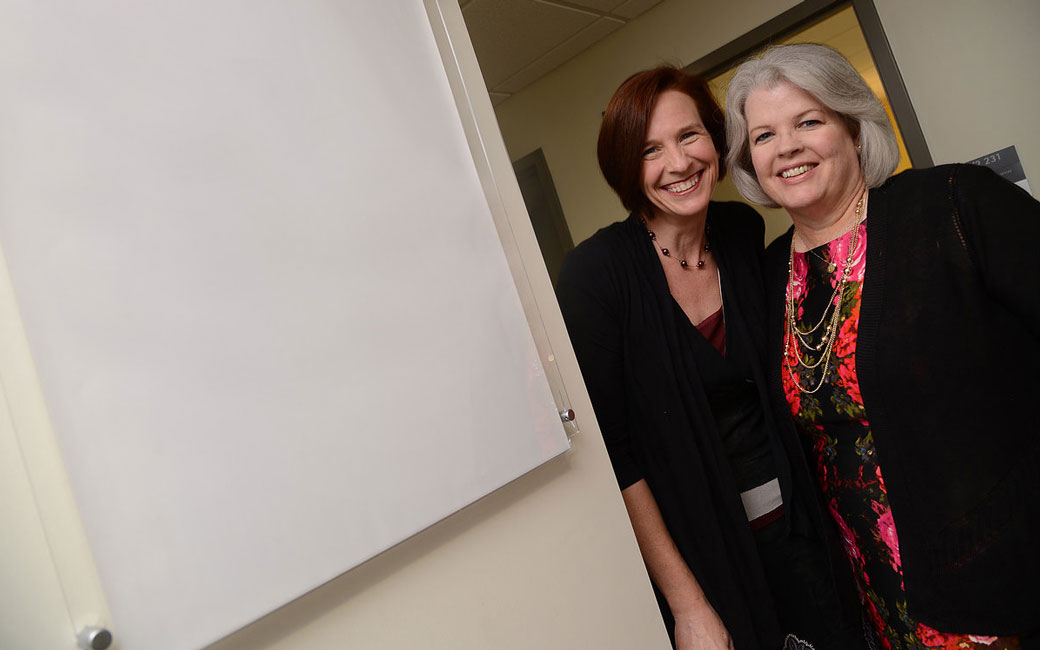From TU-backed startup to the Maryland Future 20 list
InferCabulary named one of state’s next major businesses
By Kyle Hobstetter on December 13, 2020

After beginning its journey at TU Incubator, InferCabulary, an education technology startup created to help solve illiteracy, continues to make waves across the state.
In November, Gov. Larry Hogan announced that it was included in Maryland’s Future 20.
The distinction identifies the state’s most innovative startups with the potential to be the state’s next major business success story. InferCabulary was selected from a group of 125 nominations by the business community and general public.
Co-founders Beth Lawrence ’93 and Deena Seifert say receiving this recognition has been the shot in the arm they needed while working through the COVID-19 pandemic.
“It was a real surprise and honor because the other 19 companies that were recognized are just so incredible,” Lawrence says. “This was such a great honor, because this has been a great year for us. We’ve been very busy with our heads down and grinding forward.
“To receive that recognition, it just reminds me that I can’t imagine being anywhere else than building this company.”
TU is developing a university-wide culture around entrepreneurship. Through this inclusive entrepreneurship strategy, TU aspires to be a hub for entrepreneurship where innovative ideas, people and businesses are sparked, developed and nurtured every day.
Since its time as a resident member of TU Incubator, InferCabulary has continued to grow and expand. Earlier this year the venture received a $250,000 joint investment from the University System of Maryland (USM) Maryland Momentum Fund.
Lawrence and Seifert are both speech-language pathologists who had their own practices and had met with each other off-and-on for years. In fact, Lawrence has worked with Seifert’s daughter, who has dyslexia.
They ran into each other again at a conference about using iPad apps with clients. Both realized the apps being presented focused on younger children. During lunch, the two wondered if they could design an app for middle and high school students.
“That kind of started this journey into iPad apps and then web-based apps,” Seifert says. “That first year we spent a lot of time talking to researchers and software developers to see if they could turn our idea into an app.
“We found somebody who, actually while we were talking, was translating our ideas on a yellow notepad and building our app right in front of us at a Panera table.”
In its current design, InferCabulary is a tool that helps learners infer deep meanings of nuanced words for themselves by analyzing and interpreting the common thread among carefully chosen images and provided captions.
The approach offered by their software is the opposite of rote memorization and, instead, mimics avid readership. It also is designed to teach the many contexts of words quickly, which in turn, accelerates student comprehension across the curriculum.
To help schools and teachers during COVID-19, Lawrence and Seifert offered their program for free to local districts.
InferCabulary continues to have an office with Towson University and will utilize the resources a StarTUp at the Armory upon the project's completion. The team also provides insight to other business ventures involved with TU’s StarTUp Accelerator.
“Beth and Deena were the very first founders I worked with when I joined the incubator. It has been a real privilege to work with them as they have grown InferCabulary,” says David Cross, assistant director of venture creation at TU’s Division of Strategic Partnership and Applied Research.
“What has impressed me most has been their ability to grow as founders while they have grown their business. They have such a great origin story, and throughout, they have never lost focus on what's most important—helping students to succeed."
This story is one of several related to President Kim Schatzel’s priorities for Towson University: TU Matters to Maryland, BTU-Partnerships at Work for Greater Baltimore.